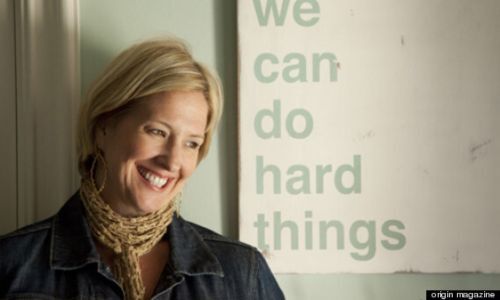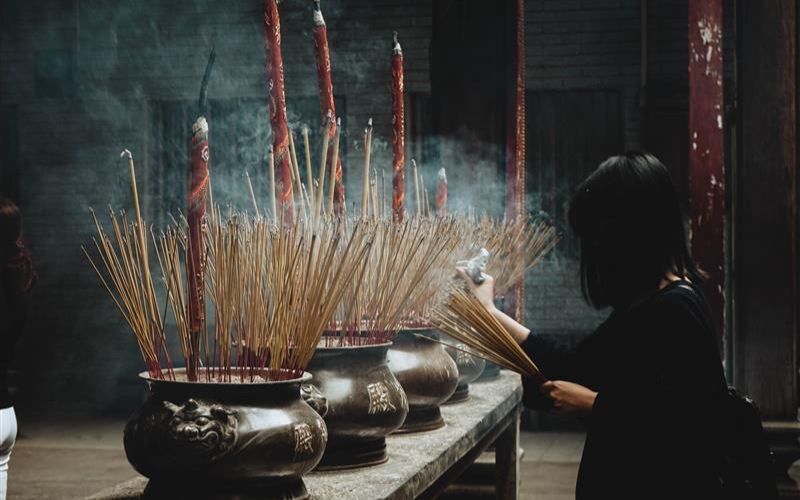Brené Brown On Why Courage, Vulnerability And Authenticity Have To Be Practiced

Photo by of Brené Brown Origin Magazine
Dr. Brené Brown on vulnerability, authenticity and being her own guinea pig. The following is an excerpt from ORIGIN Magazine.
Interviewer: Chantal Pierrat
Chantal Pierrat: Does community help with the work of vulnerability? Does it help us to become more vulnerable?
Brené Brown (BB): I can’t even think of the right word, but it’s not “help.” It’s more like a prerequisite. I think connection is why we’re here, it’s what gives purpose and meaning to our lives, and belonging is in our DNA. And so “tribe” and “belonging” are irreducible needs, like love.
CP: You started as a researcher. At what point did the researcher become the guinea pig, and how did that change your work, if at all?
BB: I’m still a researcher. The best way to explain it is that I trusted myself deeply as a professional, but I did not have a lot of self-trust personally. When I started learning all of these things about the value and the importance of belonging, vulnerability, connection, self-kindness and self-compassion, I trusted what I was learning -- again, I know I’m a good researcher. When those things and wholeheartedness started to emerge with all these different properties, I knew I had to listen. I’d heard these messages before personally but I didn’t trust myself there.
I wasn’t really testing it on myself as much as I was learning from other people about what it meant to live and love with your whole heart, and then thinking, oh my god, I’m not doing that. Everything that these folks are saying that they’re trying to move away from, like comparison, perfectionism, judgment and exhaustion as a status symbol -- that all describes my life. It was more like a medical researcher studying a disease and figuring out he or she has it.
CP: You’ve got the credibility of your research, yet there’s something in your delivery that’s really opening people up.
BB: I love how you frame that, because it’s helping me understand myself better. Someone asked me very recently why I have 8 million views on TED -- ”your work resonates, what are you doing?” What I think my contribution is, what I do well, is I name experiences that are very universal that no one really talks about. That’s the researcher in me; that’s really part of being a grounded theory researcher -- putting names to concepts and experiences that people have. That’s the researcher part. Then I tell my own story. The two things that people really need to transform is language to understand their experience and to know they’re not alone. It’s the combination of the researcher-storyteller part.
CP: For people that are new to the concept of authenticity and playing around with vulnerability and courage, actually being themselves -- is it something that can be practiced?
BB: It has to be practiced. It’s a practice for me every day, sometimes every hour of every day. It is an absolute practice. When I went into the research, I really thought that there are authentic people and inauthentic people, period. What I found is, there people who practice authenticity and people who don’t. The people who practice authenticity work their ass off at it.
It was so scary to me. Oh my god, that’s going to be a lot of work. I thought, You either have the gene or you don’t. It was scary. But it was so liberating. I thought, This is not predetermined -- I get to choose. There are some days where I have to choose five times in a day. I had to make a choice when you called and the phone rang, whether I’m going to show up and be me or whether I’m going to say what I think I’m supposed to say and get off the phone.
I had to choose this morning, when I could tell my husband was in kind of a rotten mood, whether I was just going to ignore it because I’m tired and it’s Friday and I’m packing lunches and getting kids to school and doing all this, or if I’m going to put everything down, start breakfast and look at him and say, “Hey, something is going on. I want to hear about it.” It’s a practice. It’s about showing up. And sometimes I don’t do it. I almost always regret it, but sometimes I don’t do it. Sometimes I walk into a situation where I’m intimidated and I want to be liked and I want to fit in, and I don’t choose authenticity. And it’s always pretty miserable.
CP: What about the idea that we need to protect ourselves or have boundaries?
BB: Huge. One of the most painfully inauthentic ways we show up in our lives sometimes is saying “yes” when we mean “no,” and saying “no” when we mean “hell yes.” I’m the oldest of four, a people-pleaser -- that’s the good girl straitjacket that I wear sometimes. I spent a lot of my life saying yes all the time and then being pissed off and resentful.
One of the things I talk a lot about in my work that I try to practice -- which is really hard -- is in those moments where we’re being asked to do things or asked to take over or asked to take care of something, we have to have the courage to choose discomfort over resentment. And to me, a huge part of my authenticity practice has been choosing discomfort and saying no.
On the flip side, I’ve also had to struggle with saying “yes.” Before I did this research and before I had my own breakdown and spiritual awakening around this work, my motto was, “Don’t do anything that you’re already not great at doing.” Which I think is the way the majority of adults in our culture live. Authenticity is also about the courage and the vulnerability to say, “Yeah, I’ll try it. I feel pretty uncomfortable and I feel a little vulnerable, but I’ll try it!”
CP: You’re talking about risk.
BB: That’s the whole idea behind "Daring Greatly." That whole phrase, “daring greatly,” is from the Theodore Roosevelt quote that goes back to your original question of, what about the critics? And when I read his quote it was life-changing. “It’s not the critic who counts; it’s not the man who points out how the strong man stumbles or where the doer of deeds could have done the better. The credit belongs to those of us who are actually in the arena, whose face is marred by dust and sweat and blood. We strive valiantly and sometimes there’s the triumph of achievement but at the worst, we fail, but at least we fail while daring greatly.” That has really changed my life. Profoundly changed my life.
CP: Now it’s changing the lives of others.
BB: I think a lot of us are looking for the same thing. I feel very lucky to have a definitive moment where I know everything shifted in me, and it was the moment I read that quote. Because I thought, A. That’s everything I know about vulnerability. It’s not winning, it’s not losing, it’s showing up and being seen. B. That’s who I want to be. Courage is a value. My faith is the organizing principle in my life and what underpins my faith is courage and love, and so I have to be in the arena if I’m going to live in alignment with my values.
And the last thing is, I can’t be paralyzed anymore by the critics. My new mantra is, if you’re not in the arena getting your ass kicked on occasion, then I’m not interested in your feedback. You don’t get to sit in the cheat seat and criticize my appearance or my work with mean-spiritedness if you’re also not in the arena. Now, if you’re also in the arena and you’re putting your ideas out and you’re owning them and you’re saying “I disagree with you about this and that, I think you’ve got this wrong” -- then not only do I invite that, I freaking love that. I love that. I’m an academic. I’m hardwired for a good debate.
ORIGIN is the conscious culture national print magazine bringing together art, yoga, music, humanitarianism, and sustainability to shift the planet for good. Twenty percent of our editorial is donated to nonprofits impacting the planet. You can find ORIGIN in Whole Foods, Barnes and Noble, Pharmacas, Central Markets and 15+ other National retailers.
See article from source:
Brené Brown On Why Courage, Vulnerability And Authenticity Have To Be Practiced

